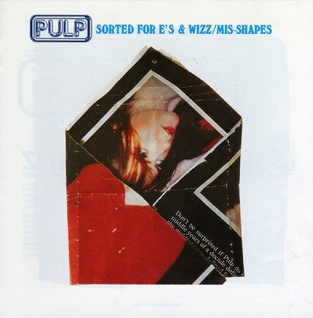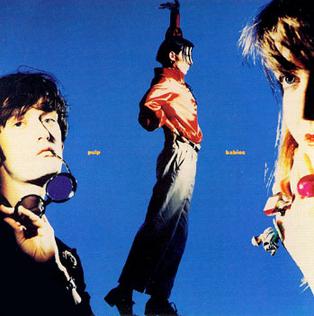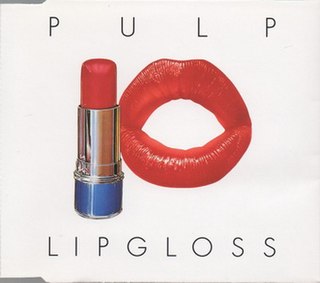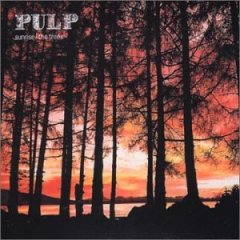
Pulp were an English rock band formed in Sheffield in 1978. Their best-known line-up from their heyday (1992–1997) consisted of Jarvis Cocker, Russell Senior, Candida Doyle (keyboards), Nick Banks, Steve Mackey (bass) and Mark Webber.

Graham Leslie Coxon is an English musician, singer-songwriter, multi-instrumentalist and painter who came to prominence as a founding member of the rock band Blur. As the group's lead guitarist and secondary vocalist, Coxon is featured on all eight of Blur's studio albums. He has also led a solo career since 1998. As well as being a musician, Coxon is a visual artist: he designed the cover art for all his solo albums as well as Blur's 13 (1999).

Think Tank is the seventh studio album by the English rock band Blur, released on 5 May 2003. Continuing the jam-based studio constructions of the group's previous album, 13 (1999), the album expanded on the use of sampled rhythm loops and brooding, heavy electronic sounds. There are also heavy influences from dance music, hip hop, dub, jazz, and African music, an indication of songwriter Damon Albarn's expanding musical interests.

We Love Life is the seventh studio album by English rock band Pulp, released on 22 October 2001 by Island Records. It reached number six on the UK Albums Chart, with a total chart stay of only three weeks. Written and recorded after the tumultuous sessions for This Is Hardcore, We Love Life saw the band move toward a more relaxed and natural sound, shepherded by producer Scott Walker. Walker had replaced original producer Chris Thomas, who the band had worked with on previous albums.

Blur is the fifth studio album by the English rock band Blur, released on 10 February 1997 by Food Records. Blur had previously been broadly critical of American popular culture and their previous albums had become associated with the Britpop movement, particularly Parklife, which had helped them become one of Britain's leading pop acts. After their previous album, The Great Escape, the band faced media backlash and relationships between the members became strained.

"Song 2" is a song by English rock band Blur. The song is the second song on their eponymous fifth studio album. Released in April 1997, "Song 2" reached number two on the UK Singles Chart, number four on the Australian ARIA Charts, and number six on the US Billboard Alternative Songs chart.

"Common People" is a song by English alternative rock band Pulp, released in May 1995 as the lead single off their fifth studio album Different Class. It reached number two on the UK Singles Chart, becoming a defining track of the Britpop movement and Pulp's signature song in the process. In 2014, BBC Radio 6 Music listeners voted it their favourite Britpop song in an online poll. In a 2015 Rolling Stone readers' poll it was voted the greatest Britpop song.

"Sorted for E's & Wizz" is a song written and performed by the English band Pulp for their 1995 album Different Class. Based lyrically on a phrase that Cocker overheard at a rave, the song features lyrics examining the hollow and artificial nature of drug culture. Because of its subject matter, the song sparked controversy in the UK, where several tabloids attacked the song.

"Help the Aged" is a song by British alternative rock band Pulp from their 1998 album, This Is Hardcore. Written as a sarcastic reflection of Pulp singer Jarvis Cocker's ageing, the song was disliked by Pulp guitarist Russell Senior who left the band before the song's release and sought to prevent it from being released as a single.

"This Is Hardcore" is a song by British indie band Pulp, and was released as the second single from their 1998 album This Is Hardcore. Written as a commentary on fame using pornography as an analogy, the song includes a sample of the Peter Thomas Sound Orchestra's "Bolero on the Moon Rocks."

"Mis-Shapes" is a song written and released by Sheffield band Pulp from their 1995 album Different Class. Lyrically inspired by Cocker's experiences socializing in Sheffield as an outcast, the song features lyrics that call for misfits to unite and take over. This lyrical theme would make Cocker uncomfortable with Pulp's growing popularity with "townies" after the song's release.

"Something Changed" is a song by British pop band Pulp, released on their 1995 album Different Class. Written much earlier in the band's existence but revived for the Different Class sessions, "Something Changed" features lyrics that focused on the random nature as to how important events happen in life. The song also features a guitar solo performed by guitarist Mark Webber.

"Babies" is a song written and released by British rock group Pulp. Featuring lyrics about a boy spying on his friend's sister from a wardrobe, the song features a guitar riff that drummer Nick Banks had played for Pulp frontman Jarvis Cocker. Though poppier and lighter than much of the band's earlier material, the band was pleased with the song and was released as a single.

"Do You Remember the First Time?" is a song by British rock band Pulp, taken from their 1994 album His 'n' Hers. With lyrics loosely based on Pulp frontman Jarvis Cocker's loss of virginity, the song saw some controversy for its sexual topic.

"Lipgloss" is a song by British rock band Pulp, from their 1994 album His 'n' Hers. With lyrics written by Pulp frontman Jarvis Cocker about the deterioration of social skills that comes with a relationship in the context of a breakup, the song was the first that the band worked on for their new record company, Island Records.

"Razzmatazz" is a song written and released by the British rock group Pulp. Featuring lyrics written by Pulp frontman Jarvis Cocker about an ex-girlfriend, the song sees the narrator mock his ex-girlfriend for leading a dull life after dumping him.

"Party Hard" is a song by British alternative rock band Pulp. Featuring David Bowie-inspired vocals, the song lyrically was inspired by the band's dissatisfaction and exhaustion with clubbing.

"Bad Cover Version" is a song by British rock band Pulp, from their 2001 album We Love Life. It was released 15 April 2002 as the second single from the album, charting at number 27 in the UK Singles Chart. It was the band's last single before their eight-year hiatus, which ended in 2011. CD1's B-sides appear as bonus tracks on the US release of We Love Life. The B-sides to CD2 are cover versions of Pulp songs performed by other artists.

"Disco 2000" is a hit single by British band Pulp, released on the band's 1995 album, Different Class. Featuring a disco-inspired musical performance, the song was based on Pulp singer Jarvis Cocker's childhood memories of his friend Deborah Bone, who he had "fancied" in his youth but could never impress.

"The Trees" is a song by British rock band Pulp, from their 2001 album We Love Life. Featuring a string sample from the Otley soundtrack song "Tell Her You Love Her," "The Trees" explores what Cocker describes as the "impassivity" of trees to witnessing the "drama" that can occur in the woods.



















